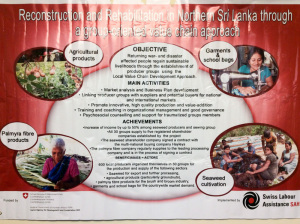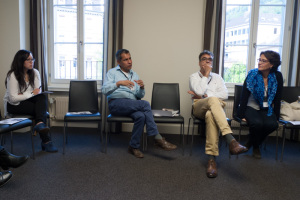Post-conflict rural market development, Sri Lanka
Market stall owner: Nimmi Ariyaratne (SDC)

The North and East of Sri Lanka were primarily devastated by the 30 year armed conflict. Over 300,000 persons were displaced and their homes and villages completely destroyed. Since the end of the armed conflict in Sri Lanka in 2009, SDC has been working with the Swiss Labour Assistance SAH, to help returnee communities in the North establish durable livelihoods.
 We initially tried the direct livelihood-aid approach through individual grants/cash for work/distribution of livelihood assets. However, we realized that in a post conflict setting the private sector engagement is essential to create durable livelihoods for returnees and re-connect them with national structures.
The direct-aid method adopted by a lot of aid agencies in Sri Lanka had created a culture of aid-dependence among returnee communities in the post-conflict North.
We initially tried the direct livelihood-aid approach through individual grants/cash for work/distribution of livelihood assets. However, we realized that in a post conflict setting the private sector engagement is essential to create durable livelihoods for returnees and re-connect them with national structures.
The direct-aid method adopted by a lot of aid agencies in Sri Lanka had created a culture of aid-dependence among returnee communities in the post-conflict North.
Accordingly, SDC and SAH changed the approach, and decided to focus on forming producer groups (2013 – 2015). These groups were then linked with large scale buyers of products at national and international level, for example:
- A large national company that exported sea-weed to Japan,
- A large national company that produces snacks from ground nuts and
- A large company making Palmyra-fibre products for the European and USA markets.
SDC/SAH played a facilitation role in creating these relationships:
- Providing training and advice to the producer groups at the initial stages, and linking them with the private sector buyers,
- Helping groups to register as small private companies themselves;
- Supporting trainings for local authorities in charge of regional development in the conflict affected provinces.
Although the engagement seems to be working at the moment, it is still too early to see if this kind of relationship is durable in the long term.


Challenges include:
- The private sector buyers don’t have much interest in teaching the groups to add value to their products,
- There is also a risk that the groups may not be strong enough to bargain with large companies for a good rate,
- At the moment no real due diligence procedures are in place when selecting buyers of products.
What does Nimmi Ariyaratne take from this market stall discussion? Watch the video:
More information can be found on
here, and in this
PDF document.
These are some of the products from the smallholder cooperatives:
Ivan Bartolini talks about challenges to work with private actors in fragile-state-context:
